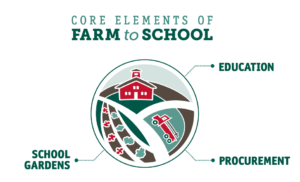In the decades to follow, the movement grew in size and scope. Now, not only do farm to school programs up the nutritional ante of cafeteria food and support local farms, they also increase nutrition education, promote school gardens, and help kids learn about and appreciate where their food comes from. Some schools even incorporate farm field trips and cooking lessons to further involve and inspire students to make wise food choices.
Today, 42% of schools nationwide are hosting some form of farm to school programming!
Timeline of Farm to School
The phrase “farm to school” can be traced back to the 1990s when pilot projects began in California and Florida to explore the possibility of transforming children's relationship with food by exposing them to fresh, local food. Here's how the movement grew:
Mid 1990s: A handful of schools across the country began a grassroots effort in response to the nature of the foods being served in school cafeterias; namely, the large amounts of processed foods and other less-than-healthful food options.
1996-1997: U.S. Department of Agriculture (USDA) began backing the movement with research and policy initiatives.
Early 2000s: With support from USDA, workshops were held nationwide to facilitate collaboration between farmers and foodservice directors, including the Farm to Cafeteria Conferences in 2001 (Washington), 2005 (Ohio), and 2007 (Maryland) that paved the way for national farm to school leadership to emerge.
2005: More than a thousand farm to school programs were operating nationwide.
2007: Official launch of the National Farm to School Network (NFSN) to provide the support and leadership needed to expand the movement.
Today: Farm to school programs touch the lives of 23.6 million students each year, with an estimated $789 million spent on procurement of local foods.
The National Farm to School Network
Officially established in 2007, the National Farm to School Network (NFSN) began as a collaborative venture of the Urban & Environmental Policy Institute at Occidental College and the Community Food Security Coalition. By 2011, NFSN had outgrown its original home and became its own organization under the fiscal sponsorship of the Tides Center, a nonprofit dedicated to building a world of shared prosperity and social justice.
As an information, advocacy and networking hub, NFSN offers resources to communities working to bring local food sourcing, school gardens and food and agriculture education into schools and other education settings. NFSN includes all 50 states, Washington D.C., Native Communities, and the U.S. Territories.
The National Farm to School Network visions includes a racially just food system for all. To that end, they've issued a bold call to action: By 2025, 100% of communities will hold power in a racially just food system. Learn more about this vision and ways you can get involved: National Farm to School Network Call to Action
October is National Farm to School Month
In communities nationwide, October is a special time for schools, farms, and supporting organizations to celebrate food education, school gardens, and local farms. If you're looking for ways to promote farm to school, learn more about the benefits, and/or get inspired to start a program at your local school, visit this NFSN web page, where you'll also find a link to a calendar of events so you can search for an event near you.
Sources/Resources
Looking Back at the History of the Farm to School Movement, Cornell College of Agriculture and Life Sciences
Occidental College Farm to School




